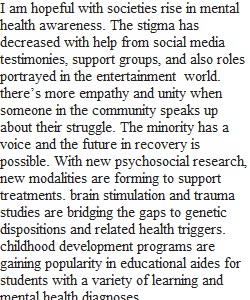


Q Misconceptions, myths, and negative thinking about mental health, mental illness and behavioral health are all around us in our daily lives. From a coworker in law enforcement calling a wellness check a " mental health run" to the parent that says their child is just being overly sensitive and needs to grow up, we can recognize the importance of appropriately understanding these terms. Throughout this course we will be addressing stigma issues related to mental health and clarifying common misconceptions and myths related to mental health. To start our exploration of these topics start to think about ones you have already experienced and can identify. For your post this module: Share a misconception, myth or negative thinking event ( like seeing stigma in action) that you have seen in your life, media, or in other areas of your culture. Make sure you feel comfortable sharing the information. Try and define what the misconception, myth, or negative thinking event is from the example you share. For your response, this module: Address one of these questions in your reply to one student's post. ~How do you think your classmate's misconception, myth or negative thinking event impacts us all as a community? ~What challenges are there to improving these experiences in our cultures? ~Where do you see hope that perceptions are changing related to the classmate's shared misconception, myth or negative event? Misconceptions, myths, and negative thinking about mental health, mental illness and behavioral health are all around us in our daily lives. From a coworker in law enforcement calling a wellness check a " mental health run" to the parent that says their child is just being overly sensitive and needs to grow up, we can recognize the importance of appropriately understanding these terms. Throughout this course we will be addressing stigma issues related to mental health and clarifying common misconceptions and myths related to mental health. To start our exploration of these topics start to think about ones you have already experienced and can identify. For your post this week: Share a misconception, myth or negative thinking event ( like seeing stigma in action) that you have seen in your life, media, or in other areas of your culture. Make sure you feel comfortable sharing the information. Try and define what the misconception, myth, or negative thinking event is from the example you share. For your response, this week: Address one of these questions in your reply to one student's post. ~How do you think your classmate's misconception, myth or negative thinking event impacts us all as a community? ~What challenges are there to improving these experiences in our cultures? ~Where do you see hope that perceptions are changing related to the classmate's shared misconception, myth or negative event? **NOTE** Try and help the whole class have a reply to each post within the discussion by replying to a post that does not yet have a response.
View Related Questions